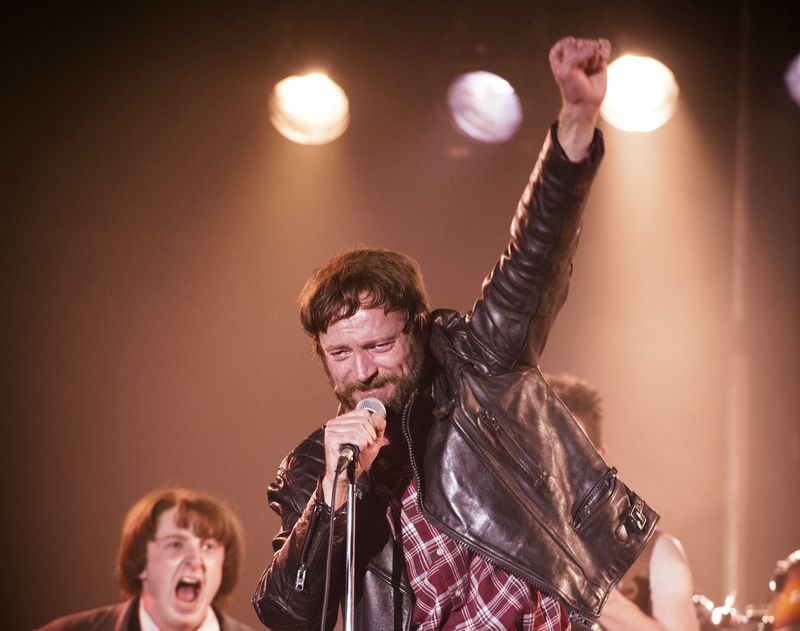After their glibly commercial debut Cherrybomb, the directorial partnership of Glenn Leyburn and Lisa Barros D'Sa have arrived, with Good Vibrations, at an altogether more arresting (and apparently true) story: one of teenage rebellion as fostered by a middle-aged Hank Williams fan with a glass eye and a beard. This would be Terri Hooley, a revered figure in Irish pop culture, who - ever since he was blinded in one eye during a childhood contretemps - set himself to finding an alternative to the violence of the Troubles, and found it by opening a record store amid the bomb-blackened storefronts of Belfast's Great Victoria Street in the mid 1970s.
Good Vibrations trundles along in a lowish gear for some while, as we watch Hooley (Richard Dormer) struggling to raise the finance required to get the business up and running, and coming to pay off some rather cartoonishly drawn Provos (represented by Adrian Dunbar in a silly wig) with a choice selection of long players. Yet it hits its groove the minute its reggae-loving protagonist ventures to a punk gig that gets rudely interrupted by the RUC. Hooley finds himself drawn to the anti-authoritarian fervour of the moshpit, where he ends up pogoing and gobbing with the best of them - a moment presented as roughly as epochal as Tony Wilson's presence at the Sex Pistols' Lesser Free Trade Hall gig in 24 Hour Party People.
As its title suggests, the film's subject is energy, and what might be done with it, and its thrust is a figure like Hooley was badly needed to energise an industry that had previously limited itself to recording whistle-and-drum bands and jingles for cheese and onion crisps. Hooley took punk into the provinces, came back with a dashboard full of demos made by the frustrated kids he found there; in the face of near-universal indifference from the Mr. Bigs of the mainland recording labels, he persisted with a bunch of chancers from Derry called The Undertones, indirectly providing John Peel with his favourite record of all time.
Cherrybomb, too, had energy to burn, but frittered it away, and Good Vibrations doesn't lack for sophomoric fumbles, particularly around the creation of "Teenage Kicks", that two-minute-twenty-six-second masterpiece of spontaneous simplicity. (And even to call it that is to intellectualise it needlessly; it's a record you feel, somewhere between a throbbing erection and a broken heart.) At first, we're denied hearing the track - making us tense up, fearing the film doesn't have the necessary clearance rights for the song so crucial to Hooley's life and work - and then Leyburn and Barros D'Sa usher on the world's worst Peel impersonator to talk it up. If nothing else, Good Vibrations is the film that proves the DJ was - unlike so many of his Radio One contemporaries - inimitable.
Yet the film is agreeably focused in its description of the context such punk faves passed into, and shook up like a joybomb: carefully inserted archive footage reminds us just what an inflamed and divided state Ireland was in when Hooley began cultivating this particular scene. Furthermore, Leyburn and Barros D'Sa know to temper the narrative's idealistic undertones with a degree of music-biz pragmatism. You see it in the rapid progress of Hooley's coke-dealing best friend within the boardrooms of London, or indeed in its subject's sincere and apparently unshakeable belief that Rudi and The Outcasts - who'll get as much of a bounce from the film as 24 Hour Party People gave The Durutti Column and Crispy Ambulance - would be bigger than The Undertones ever were. What's crucial isn't that he was right or wrong; it's that he took the chance in the first place.
Maybe it's a little too inclined towards the feelgood to generate the down-and-dirty spirit of punk: again, you sense these directors have one eye on the box-office in the closing third, as the teenage kicks of neo-Nazis (a regrettable offshoot of this movement) come to be set against adult security, and the wife and child Hooley had waiting for him back home, but Good Vibrations never quite sells out its subject, or his energies, in the search for mainstream acceptance. Buoyed by Dormer's wholly ingratiating central performance, which manages to put a twinkle in even Hooley's glass eye, this breezy celebration of music's ability to hurdle all barriers and roadblocks more than justifies its own beaming title.
Good Vibrations opens in selected cinemas from Friday.

No comments:
Post a Comment